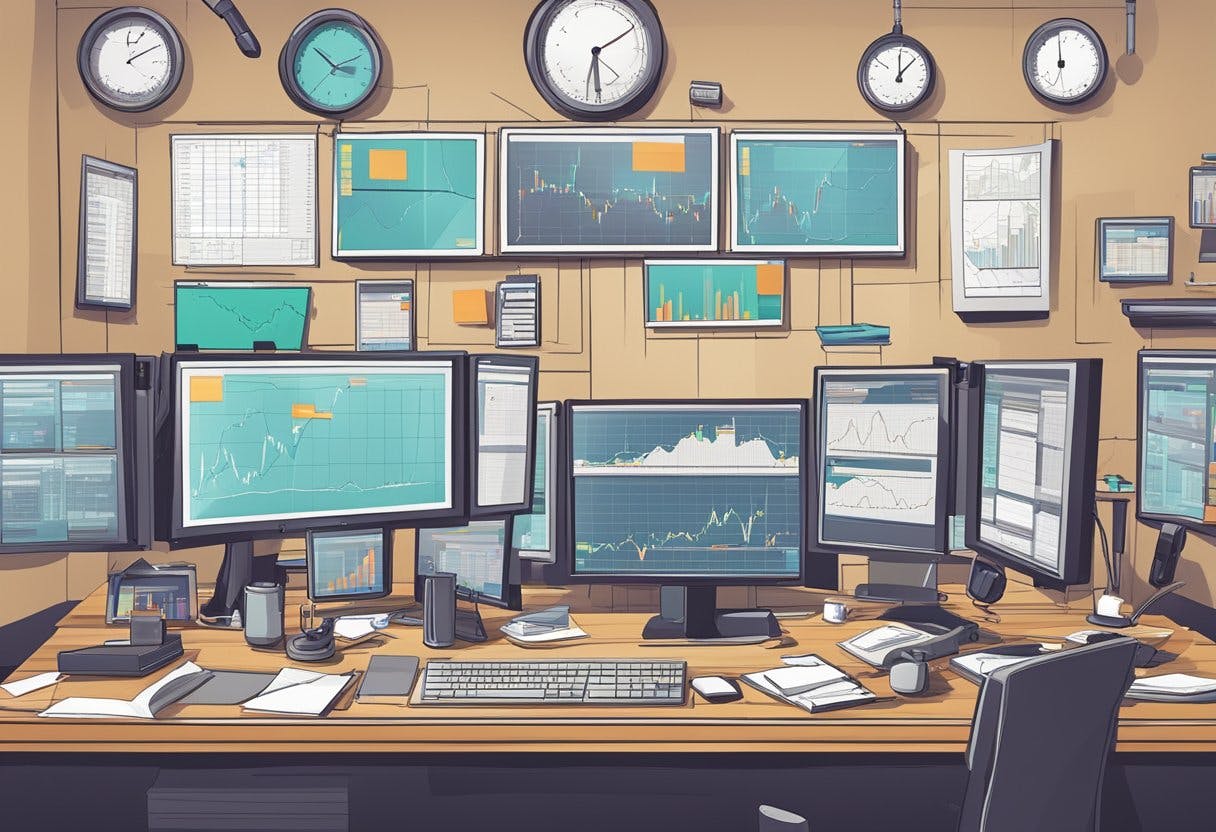
Overtrading is a common mistake that many traders make in the forex market. It occurs when a trader executes too many trades in a short period, leading to financial losses. Overtrading can be caused by various factors, such as emotional trading, a lack of discipline, or a failure to stick to a trading plan.

To avoid overtrading, traders need to develop a disciplined trading plan and stick to it. They should also understand the causes of overtrading and take practical steps to avoid it. This article will provide an overview of overtrading in the forex market, its causes, and how traders can identify and avoid it.
Key Takeaways
- Overtrading is a common mistake that can lead to financial losses in the forex market.
- Traders can avoid overtrading by developing a disciplined trading plan and understanding the causes of overtrading.
- Practical steps to avoid overtrading include limiting the number of trades per day, taking breaks after significant losses, and setting stop-loss and take-profit limits.
Understanding Overtrading

Defining Overtrading in Forex
Overtrading in the Forex market is the act of making too many trades without a proper trading plan or strategy. It occurs when a trader enters into a position too frequently and without proper analysis. Overtrading can be detrimental to a trader’s account balance and can lead to significant losses.
Signs of Overtrading
Traders who are overtrading in the Forex market may exhibit certain signs that can be identified. Some of these signs include:
- Constantly monitoring the market and taking trades impulsively without a plan.
- Trading too frequently and taking positions without proper analysis.
- Increasing position size after a string of losses in an attempt to recover losses.
- Ignoring stop-loss orders and holding onto losing trades for too long.
- Trading with emotions and not sticking to a trading plan.
It’s important to note that overtrading can be caused by a variety of factors, including emotions, boredom, or a lack of discipline. It’s important for traders to recognize these signs and take steps to avoid overtrading in order to improve their trading performance.
Traders can avoid overtrading by developing a trading plan, sticking to their strategy, and avoiding impulsive trading decisions. By setting clear entry and exit rules, using stop-loss orders, and keeping a trading journal, traders can avoid overtrading and improve their chances of success in the Forex market.
Causes of Overtrading

Overtrading is a common phenomenon in the forex market, and it can be caused by various factors. In this section, we will discuss some of the most common causes of overtrading.
Emotional Influences
Emotions such as fear, excitement, greed, and frustration can influence traders to overtrade in the forex market. Fear can cause traders to overtrade in an attempt to make up for a loss. Excitement can tempt traders to open positions without analysis when the markets are moving quickly. Greed can make traders want to make even more money when they are already making a profit. Frustration can lead traders to revenge trade, which can result in overtrading.
Market Pressure
Market pressure is another common cause of overtrading. Traders may feel pressure to trade frequently to keep up with the market or to meet their targets. This pressure can lead to overtrading, which can result in losses. Additionally, some traders may feel pressure to trade frequently to generate commission fees for their brokers. This practice is prohibited and can lead to overtrading.
To avoid overtrading, traders must develop a plan and strictly follow it. They should set achievable goals, analyze the market, and monitor their emotional state. Traders should also set stop losses and take breaks to avoid burnout. By following these steps, traders can avoid overtrading and improve their performance in the forex market.
Developing a Disciplined Trading Plan
A well-defined trading plan is an essential tool for avoiding overtrading in the forex market. It helps traders to stay focused on their goals and minimize the tendency to make impulsive trades. A trading plan should include specific entry and exit criteria, profit targets, stop loss, and limits.
Setting Clear Goals
Setting clear goals is a critical step in developing a disciplined trading plan. Goals help traders to stay motivated and focused on their long-term objectives. A trader should set realistic goals based on their trading experience, risk tolerance, and financial situation. Goals should be specific, measurable, achievable, relevant, and time-bound.
Risk Management Strategies
Risk management is an essential component of a disciplined trading plan. Traders should develop risk management strategies that help them to minimize losses and maximize profits. A trader should set stop loss orders to limit their potential losses and take profit orders to lock in profits. They should also use position sizing to manage their risk exposure and avoid overtrading.
In conclusion, developing a disciplined trading plan is crucial for identifying and avoiding overtrading in the forex market. A trading plan helps traders to stay focused on their goals and minimize the tendency to make impulsive trades. By setting clear goals and using risk management strategies, traders can develop discipline and maintain focus.
Practical Steps to Avoid Overtrading
Overtrading can be a significant problem for Forex traders, leading to poor financial outcomes and emotional stress. To avoid overtrading, traders should follow practical steps that help them stay focused and disciplined. The following are some of the practical steps that traders can take to avoid overtrading:
Adopting Patience and Research
One of the most important steps to avoid overtrading is to adopt patience and research. Traders should take their time to research the market and analyze the trends before making any trades. This will help them make rational decisions based on facts rather than emotions. Patience is also crucial when waiting for the right entry and exit points. Traders should not rush into trades but wait for the right opportunity to present itself.
Creating Effective Trading Rules
Creating effective trading rules is another practical step to avoid overtrading. Traders should have a clear strategy that outlines their trading goals, entry and exit points, and risk management. This will help them stay focused and disciplined, avoiding impulsive trades that can lead to overtrading. Traders should also set realistic goals and avoid making exaggerated or false claims.
A trading plan should include a list of trading rules that are easy to follow and understand. These rules should include the maximum number of trades per day or week, the maximum risk per trade, and the maximum loss per day or week. Traders should also have a clear plan for when to stop trading, especially if they are experiencing emotional stress or financial losses.
By adopting patience, research, and creating effective trading rules, traders can avoid overtrading and improve their financial outcomes. It is essential to stay focused and disciplined, making rational decisions based on facts rather than emotions.
Maintaining Trading Performance
To maintain trading performance, it is important to take regular breaks and reflect on trading decisions. This can help traders avoid overtrading and improve their profitability.
Regular Breaks and Reflection
Taking a break from trading can help traders avoid burnout and maintain attention and focus. Traders should take breaks at regular intervals, such as every hour or two, and use this time to reflect on their trading decisions. This can help traders identify patterns in their behavior and avoid making the same mistakes in the future.
Reviewing Trading Journal
Reviewing a trading journal can provide valuable insights into trading performance. Traders should keep a detailed record of all their trades, including the entry and exit points, the size of the position, and the profit or loss. By reviewing this information, traders can identify patterns in their behavior and make adjustments to their trading strategy.
Overall, maintaining trading performance requires a combination of discipline, focus, and attention to detail. By taking regular breaks, reflecting on trading decisions, and reviewing a trading journal, traders can improve their profitability and avoid overtrading.
Frequently Asked Questions
What are the signs of overtrading in the forex market?
Overtrading can be identified by keeping an eye on the frequency and size of trades. If a trader is making too many trades within a short period, it can be a sign of overtrading. Similarly, if a trader is risking too much of their capital on each trade, it can lead to overtrading. Other signs of overtrading include impulsive trading, chasing losses, and ignoring trading rules.
What strategies can be employed to prevent excessive trading?
One of the most effective strategies to prevent overtrading is to create and follow a trading plan. A trading plan should include specific rules for entering and exiting trades, as well as guidelines for managing risk. Traders should also avoid trading on emotions and stick to their trading plan. Setting realistic profit targets and stop-loss orders can also help prevent overtrading.
How does setting trading rules help mitigate the risk of overtrading?
Setting trading rules helps mitigate the risk of overtrading by providing a clear framework for trading decisions. Trading rules can help traders avoid impulsive trades and stick to their trading plan. For example, a trader may set a rule that they will only enter a trade if the potential profit is at least twice the size of the potential loss. By having clear trading rules, traders can reduce the risk of overtrading and improve their overall trading performance.
What role does TradingView play in managing and reviewing trading activity?
TradingView is a powerful tool for managing and reviewing trading activity. It allows traders to analyze charts and indicators, as well as monitor their open positions and trading history. TradingView also provides a platform for traders to share ideas and strategies with other traders. By using TradingView, traders can make more informed trading decisions and improve their overall trading performance.
How can traders minimize the impact of high spreads on their forex trades?
Traders can minimize the impact of high spreads on their forex trades by choosing a broker with competitive spreads. They can also trade during times of low volatility when spreads are typically lower. Another strategy is to use limit orders to enter and exit trades, which can help reduce the impact of spreads on trading performance.
What are effective risk management techniques for forex traders to follow?
Effective risk management techniques for forex traders include setting stop-loss orders, using proper position sizing, and diversifying their trading portfolio. Traders should also avoid risking too much of their capital on any single trade and should be prepared to accept losses as part of the trading process. By following effective risk management techniques, traders can reduce the risk of catastrophic losses and improve their overall trading performance.
Read More




